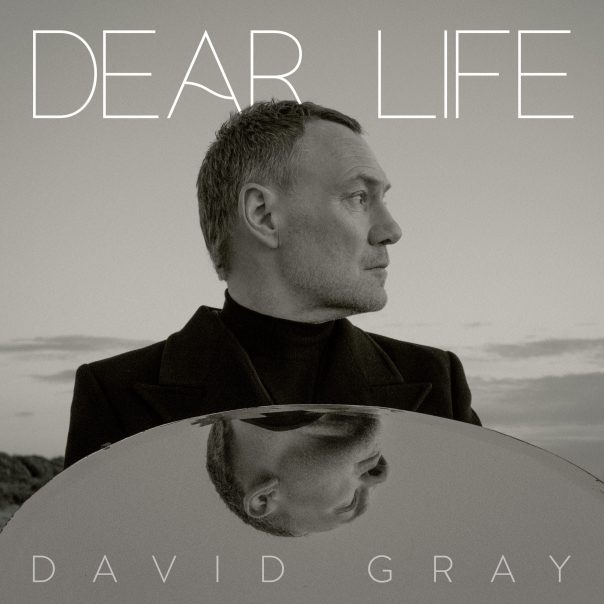ALBUM REVIEW: David Gray goes on an ‘artistic journey’ with ‘Dear Life’

David Gray, “Dear Life.”
David Gray shot to fame at the turn of the century with his third album, White Ladder. He then went from gigs in Irish bars to Glastonbury. White Ladder—not something by U2—remains the best-selling album of all time in Ireland.
Dear Life
David Gray
Laugh A Minute/Secretly Distribution, Jan. 17
9/10
Get the album on Amazon Music.
Gray has described his 13th LP, Dear Life, as a “personal artistic journey” and touches on themes like love, change and mortality. At first listen, it feels more pop than personal. While he recorded in a small studio, its production feels more expansive than previous releases, particularly 2021’s Skellig.
However, that doesn’t detract from Gray’s heartfelt lyrics or musical elements that keep much of the album from veering into dance music. While it does seem like a callback to White Ladder, Gray’s vocals and lyrical style have matured, leaving Dear Life seeped in folk-rock stylings.
Single “After the Harvest” begins the record, hooking you with a beat that blends acoustic and electronic percussion with contemporary reverb-laden vocals. Coming off as a rock tune a la the Shins, it digs deeper, especially with the chorus’ string accompaniment elevating it to more ethereal territory.
“Plus & Minus,” a duet with 18-year-old British singer-songwriter Talia Rae, is a departure from Gray’s signature sound, leaning into pop production with an electronic beat and strings, with lamentations about a fractured relationship. “Remind me why we’re doing this/ You know it’s silly, but I keep forgetting/ Darling, from where I’m sitting, hey/ This whole routine is getting old,” they sing, Rae’s vocals beautifully complementing Gray’s. For being a relative newcomer, she holds her own against someone so seasoned.
Melancholic album standout “Eyes Made Rain” possesses a modern pop vibe while sounding unlike most contemporary releases. If it makes you ponder, “where have I heard this before?” that’s because it calls back to “Please Forgive Me,” from White Ladder.
On the nearly seven-minute-long mellow tune “Leave Talking,” Gray fills every second with precision. Nothing—from reverberating vocals to brass accompaniment—feels out of place. A singular musical journey within a larger one, it finds Gray at his best.
Then, on “I Saw Love,” Gray’s songwriting takes the wheel. The song is an amalgamation of Jeff Buckley, Harry Nilsson, Donovan and Bob Dylan; maybe even a little Chris Martin as it harkens back to White Ladder’s “This Year’s Love.”
The eclectic, playful “Fighting Talk,” featuring Gray’s daughter Florence Gray, details a back-and-forth between a couple’s differing perspectives, where one laments about challenges and the other counters with living in the moment. Piano ballad “Sunlight on Water” paints a vivid tale with poetic imagery. Accompanying strings give it a dreamy vibe, while powerful vocals on the chorus allow it to soar. This is Gray at his most vulnerable, and it is a beautiful place.
Gray is the epitome of singer-songwriter on “That Day Will Surely Come.” An acoustic track with sparse accompaniment, it sounds like it could’ve been released along with songs by a plethora of 1970s singer-songwriters like James Taylor, Cat Stevens, and Harry Chapin, while simultaneously appropriate during the 2000s’s indie rock era, where Gray’s music initially took off. One could hope that Gray will perform this during his world tour, as it would be a worthy live solo performance.
“Singing for the Pharaoh,” the album’s third single, has a mellow pop vibe while staying rooted in indie rock. It’s catchy, upbeat, and sounds designed for radio airplay.
The rest of Dear Life finds Gray experimenting with varying rhythms. “Acceptance (It’s Alright)” has the most contemporary sound on the album. “Future Bride” provides a light mix of pop-rock flavored with Gray’s succinct vocals, which justly expresses the excitement of spending forever with someone. “The Only Ones” has a celestial vibe, like it was designed for stargazers, and its unusual percussion keeps it from turning into a snooze.
Album closer “The First Stone” weaves a tapestry of melancholic balladry with psychedelia, ethereal prog rock and moody vocals reminiscent of Skellig’s title track. Some versions of the record include a couple other songs, but they were not available for review.
While some may find Gray’s sound and lyrical style to be too introspective, Dear Life is proof that some things only get better with age. It’s not a belated sequel to White Ladder, but it feels as though Gray has come full circle. And what an artistic journey it’s been.
